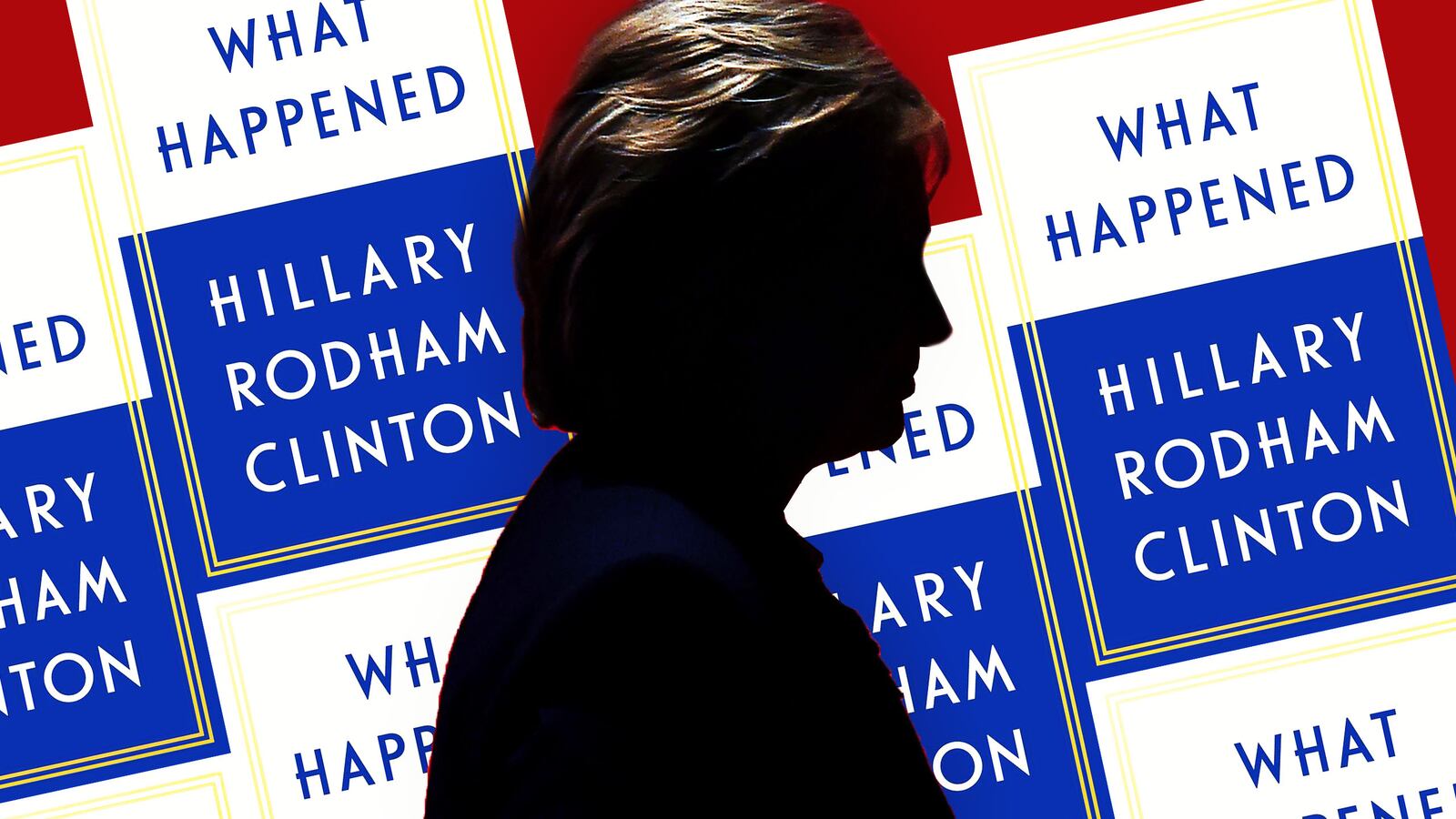Hillary Clinton thinks she knows all of the reasons a person might not want her to write a book about the 2016 election. And she wrote it anyway.
Since November, Hillary Clinton has used some of her unexpected free time to write nearly 500 pages about what happened in the months leading up to and following the election. In What Happened, the former secretary of state lays out why things went sideways, takes some blame on herself but throws plenty of it around, too. Pre-publication reviews of the book have centered on who Hillary blames for What Happened—Putin, Trump, Comey, The New York Times’ vigorous dry-humping of the email story, optics media letting gaffe-driven shitstorms obscure substantive engagement in policy.
Some Clinton watchers will see her book as an agenda-setting set of guidelines for #TheResistance. Others will read it as sour grapes. Its historical value remains to be seen. As it stands, the best parts of the Hillary Clinton’s book coalesce to form the best profile of Hillary Clinton that will ever be written, because it’s honest and open in a way Clinton rarely is with the press.
The first bit of the book is a treasure trove of colorful insider details: George W. Bush describing Trump’s inaugural address as “some weird shit”; Clinton slyly writing that she thought Jason Chaffetz was Reince Preibus; how the niece of a high-ranking Trump administration official confessed to her, during the inaugural proceedings, that she’d voted for Hillary. The numb strangeness that was Inauguration Day 2017 for people who were still shocked by Trump’s victory.
In the first part of What Happened, Hillary Clinton is an everywoman facing hardships, but with Secret Service protection and millions of dollars. She is planning a Thanksgiving dinner in her home at the end of a cul-de-sac in Westchester. She is hiking in the forest. She’s fighting about Costa Rican hot sauce. She name drops both Chipotle and Oscar de la Renta (the person, not the brand), NCIS: Los Angeles (which Bill thinks is the “best of the franchise”), and a makeup artist introduced to her by Anna Wintour. Unlike the times she’s running for office, she doesn’t seem to have an agenda.
Strangely, perhaps tellingly, as I’m reading this, I become annoyed, and I become self conscious about why I am annoyed. I am pretty sure that if Hillary Clinton were any other celebrity, it wouldn’t bother me if she was retreating to an expensive mountain retreat when she was depressed, that she was cavorting with designers. I wouldn’t be upset about her taking advantage of her resources to address her own needs. She’s rich! Why should I care if she has a private guru or a person who teaches her to breathe one nostril at a time?
Hillary Clinton is also aware of how she is singled out. In one chapter, she asks why she’s the one who has gotten pummelled for what many others in her position have done? Why? She is honestly at a loss, she says. She lays out exactly why she should have won. Charts, graphs, word clouds. But she still lost.
Despite all this, if Clinton subscribes to the belief that history is written by the winners, she writes from the position of someone who thinks that history will one day view her as the winner of something beyond the election, the battle for Americans’ hearts and minds, the battle for history books.
And, in parts of Clinton’s book, it seems like she’s making a run at writing a history book. Reading it, I realized it’s convenient to have the constantly-shifting dunes of ridiculousness frozen for a second from a perspective zeitgeisty enough to have likely historical significance. What Happened is a nice walk down memory lane, if one of the features of memory lane was a highlight reel of one’s recent worst memories. If a person can stomach it.
On a practical level, future college students learning about how weird this period in American history was will likely be assigned the middle two-thirds of What Happened, alongside hours of recordings of State of the Union and a ream of Maggie Haberman bylines. They’ll probably enjoy reading it. The writing is clear and straightforward, liberally cited. Funny, at times.
Clinton addresses why she lost, but doesn’t come to any conclusions. It’s not clear many American voters or analysts have. In Hillaryland, What Happened is a bunch of worst-case scenarios came to fruition at the same time, in a way that benefitted the same parties. She doesn’t feel sorry for herself, as much as Clinton haters would prefer.
The problem with What Happened isn’t that the book isn’t engaging—it is. It’s not that the book isn’t interesting—it is. It’s not that the book isn’t funny in parts, thoughtful in parts, punctuated with flashes of color and astute analysis only somebody who has lived her life could provide—What Happened is all of those things.
The problem is that while the subject matter is vitally important to American discourse, no matter what Hillary Clinton says or does, no matter how right she is, she’s still associated with what amounts to be, among a certain population, a national trauma.
The 2016 election was seismically disruptive to some Americans’ hopes, and many more Americans’ expectations. Never in my life have I lived through a 24-hour period when more people realized nearly simultaneously that a major piece of what they thought they knew was wrong. To those people, Donald Trump’s defeat of Hillary Clinton was like walking out into what looked like a sunny day only to be struck by lightning. And to those people, anything Hillary Clinton says about that event, no matter how astute, will be viewed with hostility.
Until that pain fades, What Happened will be an uncomfortable monument to everything we got wrong.






